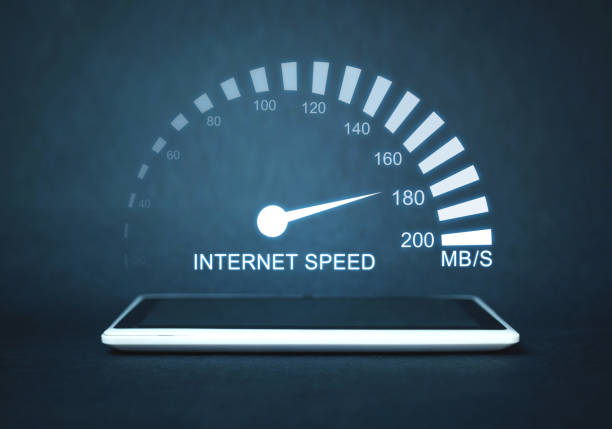Introduction to Internet Speed
In today’s digital age, internet speed is a crucial feature of our online experience. Whether we’re online shopping, taking online classes, streaming videos, gaming, or working remotely, the speed of our internet connection is very important. It can significantly impact our productivity and enjoyment. As we are into 2024, understanding and optimizing internet speed becomes even more vital.
Well, with plenty of features out there, it can be a tough task to choose the right internet plan for your needs. To help you with that, we present you here with a complete guide to internet speed. It has everything you need to know about. So let’s get started.
What is Internet Speed?
Internet speed refers to the rate at which data is transferred between your device and the internet. It is typically measured in terms of megabits per second (Mbps) and determines how quickly you can download files, stream videos, browse websites, and perform other online activities. In simpler terms, internet speed determines how fast you can access and interact with content on the internet.
Importance of Internet Speed in 2024
The year 2024 brings forth a myriad of technological advancements and innovations, from augmented reality to smart cities. With these advancements, the demand for faster and more reliable internet speeds continues to soar. Businesses rely on high-speed internet for seamless operations, while individuals seek faster connections for entertainment and communication purposes.
Understanding Internet Speed Metrics
What is Mbps?
Mbps stands for megabits per second and is a measure of the rate at which data is transferred over the internet. The higher the Mbps, the faster the internet speed. It determines how quickly you can download or upload files, stream videos, or browse websites.
What is latency?
Latency, often referred to as ping, is the time it takes for data to travel from your device to a server and back again. It’s measured in milliseconds (ms) and plays a crucial role in online gaming, video conferencing, and real-time communication. Lower latency results in a more responsive internet connection.
Factors Affecting Internet Speed
Type of connection
Different types of internet connections, such as DSL, cable, fiber-optic, and satellite, offer varying speeds and reliability. Fiber-optic connections typically provide the fastest speeds, while satellite connections may experience latency issues due to signal travel distance.
Network congestion
During peak hours or in densely populated areas, network congestion can occur, leading to slower internet speeds. This congestion occurs when many users are simultaneously accessing the internet through the same network infrastructure.
Hardware and software limitations
Outdated routers, modems, and devices can bottleneck your internet speed. Additionally, software issues such as malware or outdated browser versions can affect your browsing experience.

How to Measure Internet Speed
Measuring internet speed is essential to ensure you’re getting the level of performance you expect from your internet service provider. Here’s how you can measure your internet speed:
Use Online Speed Test Tools: There are numerous websites and apps available that allow you to conduct speed tests quickly and easily. Popular speed test tools include Ookla’s Speedtest.net, Fast.com by Netflix, and Google’s Measurement Lab (M-Lab). Simply visit one of these websites or download their respective apps, and click on the “Start Test” button to begin.
Conduct the Speed Test: Once you initiate the speed test, the tool will measure your internet connection’s download speed, upload speed, and ping (latency). The download speed represents how quickly data can be transferred from the internet to your device, while the upload speed measures the rate at which data can be sent from your device to the internet. Ping, or latency, measures the time it takes for data to travel from your device to a server and back again, indicating the responsiveness of your connection.
Interpret the Results: After the speed test is complete, you’ll be presented with the results, typically displayed in Mbps (megabits per second) for both download and upload speeds, and in milliseconds (ms) for ping. Compare your speed test results to the internet speed advertised by your ISP to see if you’re getting the speeds you’re paying for.
Consider Factors Affecting Speed: Keep in mind that internet speed can vary throughout the day due to factors such as network congestion, the number of devices connected to your network, and the type of connection you have. It’s a good idea to conduct multiple speed tests at different times of the day to get a more accurate picture of your internet speed.
Troubleshoot If Necessary: If your speed test results are significantly lower than expected, there are several troubleshooting steps you can take to improve your internet speed. This may include restarting your router and modem, optimizing your network settings, or contacting your ISP for assistance.
Internet Connection Types
There are several types of internet connections available, each with its own characteristics and advantages. Some common types of internet connections include:
DSL (Digital Subscriber Line): DSL uses existing telephone lines to transmit data and provides internet access. It offers faster speeds than traditional dial-up connections and is widely available in urban and suburban areas.
Cable: Cable internet utilizes cable television lines to deliver high-speed internet access. It is known for its fast download speeds and is often bundled with television services by cable providers.
Fiber-optic: Fiber-optic internet uses fiber-optic cables to transmit data using light signals. It offers incredibly fast and reliable internet speeds, making it ideal for streaming, gaming, and other bandwidth-intensive activities.
Satellite: Satellite internet delivers internet access via satellite signals. It is a viable option for rural or remote areas where traditional wired connections are not available. However, satellite internet may experience latency issues due to signal travel distance.
Fixed Wireless: Fixed wireless internet uses radio signals to provide internet access to homes and businesses. It relies on antennas mounted on buildings or towers to transmit and receive data. Fixed wireless can offer high-speed internet in areas where wired connections are impractical.
Mobile Broadband: Mobile broadband utilizes cellular networks to provide internet access on mobile devices such as smartphones, tablets, and mobile hotspots. It offers flexibility and convenience but may have data caps and slower speeds in congested areas.
| Call 866-861-4084 for Internet Deals |
Reasons for Slow Internet
There are several potential reasons why your internet connection may be slow. Here are some common factors that can affect internet speed:
Network Congestion: During peak hours or in densely populated areas, network congestion can occur, leading to slower internet speeds. When many users are simultaneously accessing the internet through the same network infrastructure, it can result in decreased speeds for everyone.
Type of Connection: The type of internet connection you have can impact your internet speed. For example, DSL and satellite connections may offer slower speeds compared to cable or fiber-optic connections. Upgrading to a faster connection type can help improve your internet speed.
Distance from the Router: If you’re using a Wi-Fi connection, your distance from the router can affect the strength and speed of your connection. Walls, furniture, and other obstacles can also interfere with Wi-Fi signals, resulting in slower speeds. Moving closer to the router or using a wired Ethernet connection can improve your internet speed.
Outdated Hardware: Outdated routers, modems, and devices can bottleneck your internet speed. If your hardware is old or incompatible with newer technologies, it may not be able to support faster internet speeds. Upgrading to newer, more efficient hardware can help improve your internet speed.
Software Issues: Malware, viruses, and outdated software can also affect your internet speed. These issues can cause your device to use more bandwidth than necessary or interfere with your network connection. Performing regular malware scans and keeping your software up to date can help prevent these issues.

Improving Internet Speed
Upgrading internet plan
One of the most straightforward ways to improve internet speed is by upgrading your internet plan to a higher speed tier offered by your service provider. However, it’s essential to consider factors such as cost and availability in your area.
Optimizing router settings
Optimizing your router settings, such as adjusting the channel, updating firmware, and relocating the router to a central location, can enhance your Wi-Fi signal strength and improve internet speed.
Using wired connections
For the most stable and reliable internet connection, consider using wired Ethernet connections instead of Wi-Fi. Ethernet cables offer faster speeds and lower latency compared to wireless connections.
Future Trends in Internet Speed
As technology continues to advance, several trends are shaping the future of internet speed:
5G technology
The rollout of 5G networks promises to revolutionize internet connectivity with significantly faster speeds and lower latency. 5G technology enables seamless streaming, gaming, and communication experiences on mobile devices and IoT devices.
Fiber-optic expansion
Fiber-optic internet infrastructure is expanding rapidly, offering gigabit-speed connections to homes and businesses. As more areas gain access to fiber-optic networks, internet speeds are expected to increase exponentially.
Conclusion
That’s all from our side. Nowadays, we all know how important internet speed is in our online world. It affects everything, from watching videos to getting work done. As we move through the digital world of 2024 and beyond, it’s important to understand how fast our internet is, fix any problems we face, and keep up with new trends to make sure our online time is the best it can be.
Unique FAQs
Is faster internet speed always better?
While faster internet speed typically translates to better performance, it’s essential to consider your specific needs and usage patterns. For casual browsing, moderate speeds may suffice, while activities like gaming or 4K streaming may require higher speeds.
Can I improve my internet speed without upgrading my plan?
Yes, optimizing your network hardware, minimizing network congestion, and using wired connections can often improve internet speed without the need for plan upgrades.
How do I know if my internet speed is sufficient for remote work?
If you frequently experience lag during video calls, delays in file uploads or downloads, or sluggish web browsing, your internet speed may not be sufficient for remote work. Conducting a speed test can help assess your current speed and determine if upgrades are necessary.
What should I do if my internet speed suddenly drops?
If your internet speed suddenly drops, try restarting your router and modem, checking for any software updates, and contacting your service provider to inquire about any network issues in your area.
Will emerging technologies like satellite internet improve internet speeds in rural areas?
Emerging technologies like satellite internet have the potential to bridge the digital divide in rural areas by providing high-speed internet access where traditional wired connections are limited. However, factors such as latency and weather interference may still pose challenges.

Meet Jennifer Harper, a wordsmith extraordinaire who has been shaping the digital landscape with her creative prowess for the past two years. Not just a content writer; she is a storyteller who brings the content to life. Her passion for internet trends, memes, and the ever-evolving world of entertainment is evident in every piece she creates. Jennifer doesn’t just follow trends; she sets them.